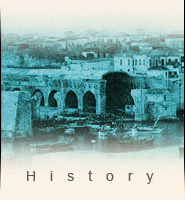
Business Enterprises
Although economic activity was still oriented around agricultural produce, with olive oil as the main export commodity, this period also saw important and interesting changes in the economic sphere. As the port became increasingly international in character and orientation, links were forged with the great harbour towns of the Mediterranean - Alexandria, Piraeus, Hermoupolis on Syros, Venice, Trieste and Marseilles.
Together with institutional and legislative reforms, the restoration of peace and order created favourable conditions for the local economy. Ever increasing numbers of Greek and overseas firms acquired representatives and set up branches in the town. A large number of sizeable local businesses sprang up and grew in this climate of optimism and security, including several workshops and factories.
Indicative of this is the fact that in 1911 the town had seven steam ship agencies and six insurance brokers, as well as banks, trading companies and workshops and industrial plants including olive oil mills, soap factories, sultana factories and tanneries. Interest in tobacco cultivation and processing was also intense.
Newspaper advertisement from Heraklion, Year I, issue 30, 3rd March 1894 (Historical Museum of Crete, © S.C.H.S, Heraklion)
Twenty-five drachma note issued under Cretan Autonomy (Yiorgos I. Panayiotakis, Heraklion)
View of the port at Heraklion (Borel-Boissonnas, Benaki Museum, Athens)
The neighbourhood known as the Vareladika (Coopers' Yards) near the Church of St. Dimitrios
Shops and warehouses in Heraklion, 1900 - 1905 (G. Gerola, Vikelaia Municipal Library, Heraklion)
Heraklion lawyers, 1911 (Vallio Katechaki-Malagardi Archive, Historical Museum of Crete, © S.C.H.S, Heraklion)
1898
1898
1899
1899
1900
1902
1905
1906
1906
1908
1908
1909
1909
1910
1911
1912
1913















